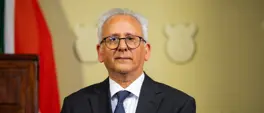As EU preps to fully implement carbon border tax, African countries brace for impact on GDP
Paula Luckhoff
12 November 2025 | 19:10Tribe Africa Advisory's Rutendo Hwindingwi looks at the top news stories from around the continent on The Money Show.

Tutuka Power Station, Eskom, coal-powered. Image: Eyewitness News
As the European Union (EU) prepares to fully implement the world’s first carbon border tax from 1 January 2026, African countries are bracing for the impact on their exports.
Under its Carbon Border Adjustment Mechanism (CBAM), the EU imposes a carbon charge on certain imports, matching the cost faced by its own producers under the Emissions Trading System (ETS), and replacing free allowances for high-risk sectors.
The organisation says this levels the playing field, encourages global decarbonisation, and protects EU industry from unfair competition.
Africa business specialist Rutendo Hwindingwi refers to a 2023 study from the London School of Economics and Political Science, which looked at six scenarios for the CBAM, using two different economic modelling approaches:
In one model, with carbon priced at €87 (about R1,700) per tonne, the Mechanism is forecast to reduce the GDP of no single African country by more than 0.18%. The other model, at the same price, forecasts a reduction in the GDP of the continent by 0.91% – equivalent to a fall of $25bn (over R400 billion) at 2021 levels of GDP.
The study found that the aluminium sector would be most exposed, followed by electricity, and iron and steel exports.
"The CBAM could cause a fall of up to 13.9% in exports from Africa to the EU of aluminium; of iron and steel by 8.2%; of fertiliser by 3.9% and cement by 3.1%."
When an EU representative briefed the African Union’s Pan-African Parliament recently on preparing for CBAM, he was not warmly welcomed, says Hwindingwi.
He points out that while trying to level the playing field for importers getting commodities from Africa makes sense from a macroeconomic perspective, the impact of that tax on countries' GDP is going to be costly.
Hwindingwi contrasts importing aluminium from South Africa and Mozambique, toexplain how the system works.
"If you're importing from a country like Mozambique, that uses hydroelectric power which is clean energy, the tax impact is less than if you're importing aluminium from South Africa, which relies on coal."
The new regime of import tariffs in the US muddies the waters when it comes to export options for Africa, Hwindingwi says.
"People will no longer be saying, ok let's focus on America, so this starts pushing in another direction, which is east... That's the dilemma with all these tax regimes globally and the clean energy shift; it's like squeezing a balloon - it will eventually end up somewhere but who's going to benefit, that's the question."
Scroll up to the audio player to listen to Africa Business Focus (EU carbon border tax discussion at 1:31)
Get the whole picture 💡
Take a look at the topic timeline for all related articles.
Trending News
More in The Money Show

8 January 2026 20:14
Lessons in marketing and reimagining the continent from Brand Africa founder Thebe Ikalafeng

8 January 2026 19:50
Icasa 'serious' about changing rules to enable rollover of unused mobile data

8 January 2026 18:39
Manufacturing activity dropped further in December, but sector optimistic about 2026














